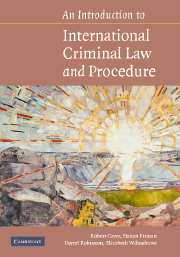Book contents
- Frontmatter
- Contents
- Preface
- Table of Cases
- Table of Treaties
- Table of Abbreviations
- Part A Introduction
- Part B Prosecutions in National Courts
- Part C International Prosecutions
- Part D Substantive Law of International Crimes
- 10 Genocide
- 11 Crimes Against Humanity
- 12 War Crimes
- 13 Aggression
- 14 Transnational Crimes, Terrorism and Torture
- Part E Principles and Procedures of International Prosecutions
- Part F Relationship Between National and International Systems
- Index
- References
13 - Aggression
- Frontmatter
- Contents
- Preface
- Table of Cases
- Table of Treaties
- Table of Abbreviations
- Part A Introduction
- Part B Prosecutions in National Courts
- Part C International Prosecutions
- Part D Substantive Law of International Crimes
- 10 Genocide
- 11 Crimes Against Humanity
- 12 War Crimes
- 13 Aggression
- 14 Transnational Crimes, Terrorism and Torture
- Part E Principles and Procedures of International Prosecutions
- Part F Relationship Between National and International Systems
- Index
- References
Summary
Introduction
Overview
Aggression is widely regarded as a crime under customary international law, although at present there is no universally agreed definition and no international court or tribunal in existence which can try offenders. It is formally within the jurisdiction of the ICC but the Court cannot exercise its jurisdiction unless and until the parties to the ICC Statute have agreed both a definition of the crime and the conditions under which the court may exercise its jurisdiction.
This is a crime which differs from all others within the scope of this book in being inextricably connected with an unlawful act of a State: the crime of aggression comprises the participation by a State's leaders and policy-makers in certain aggressive acts by a State. To understand the crime, therefore, it is necessary to understand the rules of international law on the responsibility of States for the unlawful use of force; these are discussed in brief at section 13.2.
Historical development
Leaving aside historical curiosities, the first international trial for aggression, under the name of ‘crimes against peace’, was before the Nuremberg International Military Tribunal following the Second World War. The closest, though imperfect, precedent for this trial was the provision in the 1919 Treaty of Versailles after the First World War for the establishment of a special tribunal to try Kaiser Wilhelm.
- Type
- Chapter
- Information
- An Introduction to International Criminal Law and Procedure , pp. 262 - 280Publisher: Cambridge University PressPrint publication year: 2007



